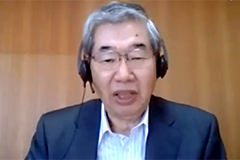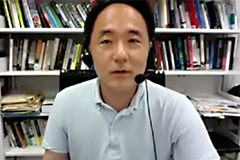Knowledge Forum: A New Path Toward a Sustainable World by Integrating International Cooperation and Measures Against Climate Change
2021.11.15
On Sept. 21, 2021, JICA Ogata Sadako Research Institute for Peace and Development (JICA Ogata Research Institute) and the Office for Climate Change of the Global Environment Department of JICA jointly hosted the Knowledge Forum titled “Tackling Extreme Climate Events Around the World: Latest Trends in Adaptation to Climate Change and Global Collaboration” online.
At the opening, Takahara Akio, executive director of JICA Ogata Research Institute, stated “Efforts to address climate change including those reducing carbon dioxide emission continue to accelerate regardless of the COVID-19 pandemic. Meanwhile, extreme climate events like record-breaking heavy rain, flooding or heatwaves are frequenting, and global warming is a major cause. We must address the challenges the world is facing and the roles Japan is required to play in international cooperation around climate change, which precisely is a hot topic now.”
First, Mimura Nobuo, distinguished fellow at JICA Ogata Research Institute (also a specially appointed professor at the Global and Local Environment Co-creation Institute, Ibaraki University) gave a keynote speech titled “Climate Change Adaptation and Challenges for International Cooperation.” Mimura is Japan’s leading expert on climate change research and an author of the assessment reports from the Intergovernmental Panel on Climate Change (IPCC). Looking back at the history of efforts to address climate change since the establishment of the IPCC in 1988, he talked about the current state of climate change issues and the outlook of future efforts. He said that there are two types of measures: the first is mitigation, reducing greenhouse gas emission; and the other is adaptation, curbing the negative impacts and increasing resilience (i.e., adaptive capacity of society) to environmental change. He then explained that while efforts had been made to reduce risks as much as possible by carrying out both types, the real game changer was the Paris Agreement adopted in 2015, which set non-mandatory goals to keep temperature rise below 2℃ and preferably below 1.5℃.

Mimura Nobuo, a distinguished fellow at JICA Ogata Research Institute and an author of the assessment reports from the Intergovernmental Panel on Climate Change, gave a keynote speech
As Mimura is a review editor in Working Group II for the IPCC Sixth Assessment, which will publish a report in 2022, he described how discussions are taking place there. He said, “With more young people and women, and with more authors (researchers) coming from different parts of the world and/or different academic backgrounds participating, the IPCC landscape has changed. The Assessment Reports once focused only on the risk management perspective of climate change, such as the mitigation and adaptation measures I just explained. However, the perspective has been expanded to consider how to create a sustainable world we want under climate change.” Thus, he pointed out that the world is moving toward finding how to integrate measures against climate change and the realization of Sustainable Development Goals (SDGs). Mimura moreover emphasized that unless we integrate traditional development assistance and measures against climate change from now on, we will not be able to see sufficient effects. He said that the adoption of both scientific approaches and locally-rooted, community-based approaches as well as the development of talents who have integrated and comprehensive visions, both within local communities and donor organizations, will be the next challenges from here.
In the talk session that followed, Adachi Ichiro, executive senior research fellow at JICA Ogata Research Institute, served as the moderator while Mimura and Narita Daiju, visiting fellow at JICA Ogata Research Institute and associate professor at The University of Tokyo, exchanged views. In response to the keynote, Narita shared the assessment results of an irrigation development project conducted by JICA in Kenya from the perspective of climate change adaptation. He explained that although the original objective of the project was securing stable water supply and not tackling climate change, the results showed that the outcomes of the project were effective in reducing future risks of loss caused by climate change. Narita also said that since the impact of climate change is full of uncertainty, it is important to communicate with local stakeholders to think about the future and ways to provide further assistance.

Narita Daiju, a visiting fellow at JICA Ogata Research Institute, participated in a session
Looking back on previous experience, Mimura said he felt that Japanese coastal engineering is not necessarily universal. For instance, concrete blocks are installed as a measure against coastal erosion in Japan, but breakwaters made of bamboo sticks and tires are used in Thailand, while coral reefs and mangroves provide ideal coastal protection in the Pacific islands. He said he realized that the most effective measures to protect nature are achieved by using appropriate, locally-rooted techniques, and stressed that we need a comprehensive approach that would address both immediate and long-term challenges based on local geographical and environmental factors and social knowledge in international cooperation. To a question from the floor asking how to secure human resources and organizations to implement adaptive measures in developing countries, both Mimura and Narita gave their opinions.
The webinar was concluded by Miyazaki Akihiro, director of the Office for Climate Change at the Global Environment Department, JICA. He said, “JICA has made a strategy to aim for interactive development that applies measures against climate change in all of its development projects and has started implementing this in April 2021. As all of us are exposed to the uncertainties of climate change, Japan wishes to address them together with the developing countries.”
JICA Ogata Sadako Research Institute for Peace and Development Knowledge Forum:
In January 2019, the JICA Ogata Research Institute launched the Forum as a venue for unfettered discussion on international development by engaging people from diverse backgrounds and perspectives. The Forum aims to serve as a knowledge co-creation platform to facilitate the sharing of knowledge on development cooperation with various stakeholders.
Knowledge Forum 'Tackling Extreme Climate Events Around the World'

事業事前評価表(地球規模課題対応国際科学技術協力(SATREPS)).国際協力機構 地球環境部 . 防災第一チーム. 1.案件名.国 名: フィリピン共和国.

事業事前評価表(地球規模課題対応国際科学技術協力(SATREPS)).国際協力機構 地球環境部 . 防災第一チーム. 1.案件名.国 名: フィリピン共和国.

事業事前評価表(地球規模課題対応国際科学技術協力(SATREPS)).国際協力機構 地球環境部 . 防災第一チーム. 1.案件名.国 名: フィリピン共和国.

事業事前評価表(地球規模課題対応国際科学技術協力(SATREPS)).国際協力機構 地球環境部 . 防災第一チーム. 1.案件名.国 名: フィリピン共和国.

事業事前評価表(地球規模課題対応国際科学技術協力(SATREPS)).国際協力機構 地球環境部 . 防災第一チーム. 1.案件名.国 名: フィリピン共和国.
scroll